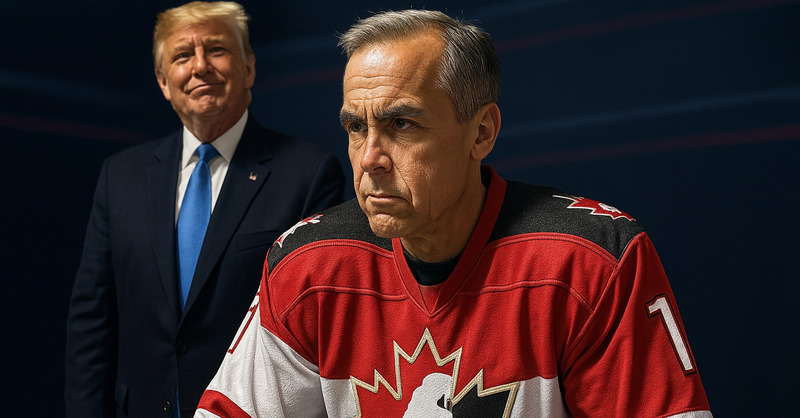A late-night, long-weekend post from the GC Newsroom X account indicates that the Government of Canada is backing down on the Digital Services Tax, following an explicit threat from U.S. President Donald Trump.
The US President threatened to immediately cease all trade negotiations with Canada until the tax issue was resolved.
During this year’s general election, Carney famously adopted an “Elbows Up” approach to Donald Trump, reassuring Canadian boomers that he would defend national sovereignty and stand up for Canadian interests.
For his part, Trump mused that Canada would be better off as America’s “51st state” and breathed life into the Liberal Party, instilling just enough fear in Canadians to buy into Carney’s promise to stand up to Trump.
But the election is over – and now Carney appears to have rolled over on a core Liberal policy.
The Digital Services Tax would have imposed a 3% levy on revenue from digital services like online advertising, social media, and user data sales by large tech companies.
It was originally set to be retroactive to 2022, with the first payments due on June 30, 2025. The tax targeted firms like Amazon, Google, and Meta, and U.S. companies faced an estimated $2-3 billion bill.
Both Donald Trump and former President Joe Biden have opposed the DST, viewing it as discriminatory against American firms.
On June 27th, this came to a head with Trump announcing the immediate termination of all U.S.-Canada trade talks, calling the DST a “direct and blatant attack” on the U.S. He threatened new tariffs within seven days, citing Canada’s refusal to pause the tax.
Earlier this month, Canadian Foreign Minister Francois Phillipe Champagne promised that the DST would go through as planned.
Rick Tachuk, President of the American Chamber of Commerce in Canada advocated for a pause of the Digital Services Tax in an op-ed published just five days ago.
The Liberals promised to introduce the tax during the 2019 general election and the Parliamentary Budget Officer had projected it could raise $7 Billion from US companies over 5 years. Its implementation had been delayed to bring others – in particular the EU – onside.
Canada has faced renewed pressure from its primary trading partner since re-electing Donald Trump as President in 2024. Trump argues he’s simply correcting a trade imbalance between the U.S. and Canada. His trade policy has had significant effect on key Canadian industries such as steel, aluminum, and auto manufacturing.
Meanwhile Canadian Prime Minister Mark Carney – elbows up or not – is finding that Canadians are starting to question his ability to handle the pressure – given how quickly this collapse has come.

 A Conservative government under the leadership of Stephen Harper will reduce the GST from 7% to 6% immediately and then to 5% within five years.
A Conservative government under the leadership of Stephen Harper will reduce the GST from 7% to 6% immediately and then to 5% within five years.
